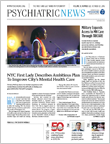Co-occurring depression and substance use disorders among people living with HIV can create significant obstacles to effective HIV care—leading to poorer adherence to antiretroviral therapy, lower rates of viral suppression, and more—and the other health services they need.
According to David Grelotti, M.D., an assistant clinical professor at the University of California, San Diego (UCSD), even if these patients access care, obtaining treatment for depression can be a challenge, since there are limited data on the interactions between antidepressants and drugs and alcohol. Grelotti is also the director of mental health services at UCSD’s Owen Clinic, which provides health care to people with HIV throughout San Diego County.
Most clinical trials of antidepressants exclude people with substance use disorder, Grelotti told Psychiatric News. Although the available data—including a meta-analysis published in 2004—suggest antidepressants provide a modest benefit in people with substance use disorder, individual studies have produced a range of mixed results, and none has included people living with HIV, he said.
To help fill this gap, Grelotti and colleagues assessed 137 homeless or marginally housed people in the San Francisco area who had co-occurring HIV and depression and were of a study comparing daily fluoxetine or referral to a community clinic for psychiatric care. Participants were not excluded from the trial if they used alcohol and/or illicit drugs. The group explored whether self-reported alcohol or illicit drug use (including crack, cocaine, heroin, and methamphetamine) compromised any of fluoxetine’s effects by comparing users and nonusers every three months over a nine-month period.
They found that while people who used alcohol or drugs tended to show smaller improvements in their depression scores, as measured by both the Hamilton Rating Scale for Depression and Beck Depression Inventory, than nonusers, there was no evidence that substance use exerted a moderating effect on fluoxetine response.
“As research continues to demonstrate the negative impact of depression and substance use on HIV treatment outcomes, our findings suggest that antidepressant treatment among persons with HIV, depression, and active substance use may also have a positive impact on public health,” the authors concluded.
“I am not shy about starting antidepressant treatment for depression in persons with HIV even if they use alcohol or drugs, especially in light of these new findings,” Grelotti told Psychiatric News. “Patients who are willing to start an antidepressant should have access to an antidepressant.”
Fluoxetine may be a good first option for patients with comorbid HIV and depression, given that it is well studied in HIV-positive individuals, is well tolerated, and does not have significant reactions with alcohol, Grelotti said. However, more research is needed to determine the interactions between fluoxetine and specific illicit drugs, he added.
The new study coauthored by Grelotti was published August 15 in AIDS Care and was supported by grants from the National Institute of Mental Health. ■
An abstract of “Does Substance Use Com-promise Depression Treatment in Persons With HIV?” can be accessed
here.
